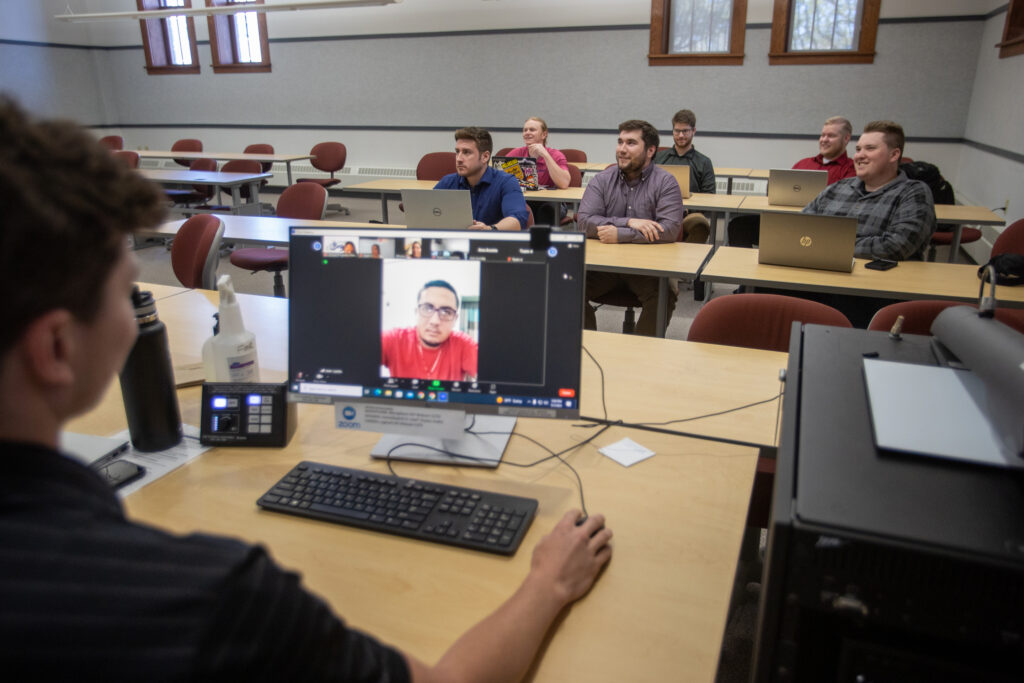
Student teams were paired with clients in Honduras, giving them the unique opportunity to help under-resourced entrepreneurs, while navigating a different language and culture. Pictured in back row: Evan Benkovich, Bryant Keeffer, and Nick Schaal; middle row: Darian Wright, John Biernat, and Alex Schulz; and in front at the desk: Joshua Ellsoos. (Photo credit: UW-Platteville)
“Perspective” is a word that was mentioned frequently when students of Dr. Caryn Stanley’s Quality Management course reflected on their spring capstone project. Every year, Stanley, associate professor in the University of Wisconsin-Platteville School of Business, pairs teams of students with a local business client for a semester-long project where the students evaluate and propose process improvements. This year, student teams were paired with clients in Honduras, giving them the unique opportunity to help under-resourced entrepreneurs, while navigating a different language and culture.
Stanley created this opportunity through a partnership with Kambia, an organization that facilitates international project-based learning for students. Throughout the first couple weeks of the semester, students completed Kambia’s instructional modules, learning more about the cultural context of Honduras and international business consulting. By the third week of the semester, students met with their Honduran clients, over Zoom, along with a Kambia-provided translator.
“The clients are all entrepreneurs and small business owners who started a business out of either necessity or passion, but with no business training and usually no more than a sixth-grade education,” said Stanley. “Students literally did the same things they would do for an organization here, but they worked through an interpreter. They had to learn key business terms in Spanish, and they had to learn how to convert U.S. dollars to Honduran lempiras on the fly. They also had to understand the culture and context – when business owners are going to pick up supplies, they’re not going to a Walmart. Many times, they’re walking a couple of miles to an open market. Sometimes students actually had meetings with clients while they were walking to markets.”
After several weeks of meeting with the clients, the student teams developed their recommendations and resources. Kambia then partnered each team with a global consultant from one of the U.S. Big 10 consulting firms, who reviewed the recommendations and provided feedback. Following this, students delivered their final presentation to their client — in Spanish.
“The biggest thing we learned was about our client’s culture,” said Skyler Youngren, whose client runs a food service and gives half the profits to a community church. “[Our client] missed a meeting one day, because a well was being installed in his community. It just helped us learn how different things are, and it was interesting to learn about different conditions.”
Other students commented on the challenge of coming up with zero-cost solutions for the businesses.
“I’m doing two different capstone projects this semester, and the other is working with a small business owner in Platteville,” said Josie Alm, whose group worked with a restaurant owner. “So, this project really gave me perspective. The [Honduran clients] had amazing ideas but just didn’t have resources to run the business.”
One of the solutions they helped their client with was developing a name and logo for her business.
“She didn’t have a name or logo, so we focused on that marketing to help her increase profits,” said Alm. “We gave her three different names and logos, and she picked one. She seemed really excited.”
Other resources teams provided to their clients included drafting job descriptions for employees, developing systems for inventory and tracking profits, and creating business cards, flyers and an elevator pitch.
“When we helped our Honduran clients, some of those rather simple solutions are actually not that different than what we would do around here,” said Darian Wright, who was also simultaneously working on a second capstone project this semester with a local client. “It made me simplify my thinking, and it was a good break to go back to the basics. I think companies around here like to try to jump over the basics to get in the market, without doing those simple things. I liked working with our Honduran client, while also working with a small business here, because there was correlation in some areas.”
Stanley hopes to continue working with Kambia, eventually developing the project into its own class, giving students a more accessible international experience.
“I am very grateful to BILSA for providing the grant funding to facilitate this experience,” said Stanley. “I want to thank the students for being flexible and adapting to the needs of the class and the clients on the fly. All of the students should be incredibly proud of the work they did this semester. It was not easy. I, myself, learned quite a bit about facilitating international consulting work and look forward to sharing the experience with other students and faculty members.”
Written by Alison Parkins
Link to original story: https://www.uwplatt.edu/news/business-students-provide-assistance-honduran-entrepreneurs
